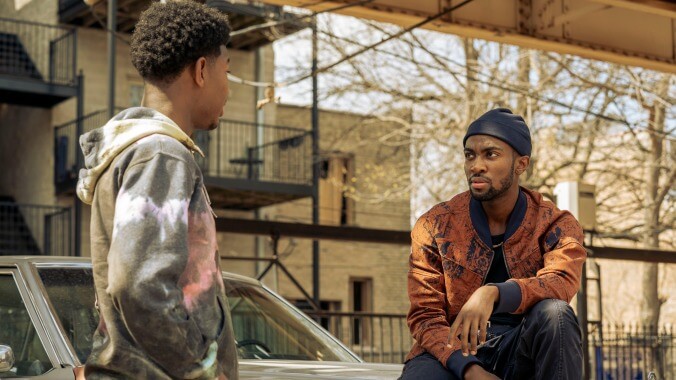61st Street is a vital tale, just not a particularly well told one
Cops and communities face off in AMC’s well-intentioned but heavy-handed South Side drama

The new AMC series 61st Street could not be more timely or necessary if it tried. Set on Chicago’s South Side, it follows the uproar that occurs when Moses Johnson (Tosin Cole), an affable high-school track star bound for a college scholarship, is accused of murdering a police officer after stumbling into a dustup on his walk home. Moses, who is not in the game, becomes, through manipulation by the Chicago Police Department and media, something like Public Enemy No. 1 to some and the manifestation of everything wrong with policing to others. It’s a story that, devastatingly, keeps unfolding in reality, on streets not too far from 61st, again and again and again.
So simply as a conversation starter, a work of fiction that gets people discussing arguably the biggest real problem of our day (and sadly many, many days before that) and spotlights something that desperately needs a spotlight, 61st Street deserves credit. If it gets one viewer mad or incredulous, or makes them want to volunteer or even changes their mind, the show has done its job. But—and not to ask an annoyingly basic, redundant question, but here it goes anyway—does a great, meaningful message make for great, meaningful TV?
Because there are great, meaningful messages aplenty here. Take just this lengthy speech, given by Moses’ pal Calvin (Jayson Lee) to public defender Franklin Roberts (Lovecraft Country’s Courtney B. Vance, the show’s star who’s pretty wonderful throughout): “My way of thinking is, Cops see Blackness as a weapon. Being Black is like, I don’t know, I might as well have a gun, you feel me? So runnin’ and fightin’, like Moses did? That’s self defense. But they don’t see it like that, or they’re blind to it. But the thing to do is…is to make the blind see.”
It’s beautifully written dialogue, sharply surmising the show’s main theme. Vance’s Franklin Roberts, in response, looks like he got the emotional wind knocked out of him: This young man, under the shade of the El tracks, has summed up what his calling as a lawyer is all about—and why he can’t quit, retirement and health be damned, not now, not when there’s so much at stake.
The “they” Calvin is talking about is the CPD. And if the show’s clear savior is Roberts (always fighting the good fight, like when he unsuccessfully begs a cynical judge to keep a family together in his first courtroom scene), Lt. Tardelli (Mindhunter’s Holt McCallany) is its villain, all smug shadiness and basically the embodiment of police corruption.
“Cops in America wake up and feel like we can’t do our jobs—or worse, we gotta say sorry for wearin’ the uniform,” he tells Officer Logan (Mark O’Brien) in an effort to get his subordinate to revise his statement to pin the blame on Moses. The show stresses this dichotomy aesthetically, too, Traffic-style, with everything in the police world captured in a blue, dim, cold color scheme, and everything in the community a golden, glowing, warm one.
That dichotomy isn’t necessarily a bad thing. Shows need someone to root for and someone to loath. And in real life, of course, very important issues need staunch stances; for any progress, we need to say which side of the fence we’re on. (That the cinematographic choice is indeed pretty powerful and on-point, we should note, starkly shifting from, say, lensing a lovely late afternoon in the neighborhood one minute, and then clinically showing a lieutenant’s office with a Blue Lives Matter flag the next.)
Unfortunately, whenever something very dramatic or frightening or unjust or important happens (and understandably, this is quite often), the show’s inclination is to distractingly swell the score, as if to announce, “This is the moment that matters, so pay attention.” It frankly can suck the audience out of the story and squash some of the verisimilitude it had been carefully building, especially when slo-mo is added to the mix.
In one cliffhanger-episode ender, when the lieutenant and public defender arrive at the same time at Moses’ hiding spot, you could find yourself asking, Isn’t this too coincidental—or even, Wouldn’t a lieutenant delegate someone with a lower rank to check this out? Then, in a press conference about the fallen policeman, Officer Logan, pregnant pauses and all, lets everything off his chest in front of a group of reporters who could accurately be described as library-quiet, in a somber-lit room sans basically any flash photography, no less.
Thankfully, though, 61st Street widens its scope on the problem more realistically, following Martha Roberts, Franklin’s wife (a great Aunjanue Ellis), a fast-rising politician who embraces the “defund the police” movement, fires up locals about lack of school resources, and has a legitimate tiff with a journalist, as well as Moses’ brother Joshua (Bentley Green), who starts dipping his toes into the game.
It’s unfair, really, to put the weight of a city and its problems on a single show. Besides, if the amazing 2020 docuseries about Chicago, City So Real, still had blind spots at nearly six hours, anything will. That city and that problem are just too complicated. But we’d like to think that without the heavy-handed style, with more subtlety, more trust in the audience to get it, even more gray areas, 61st Street really could have really connected. Then again, maybe now’s not the time for subtlety.